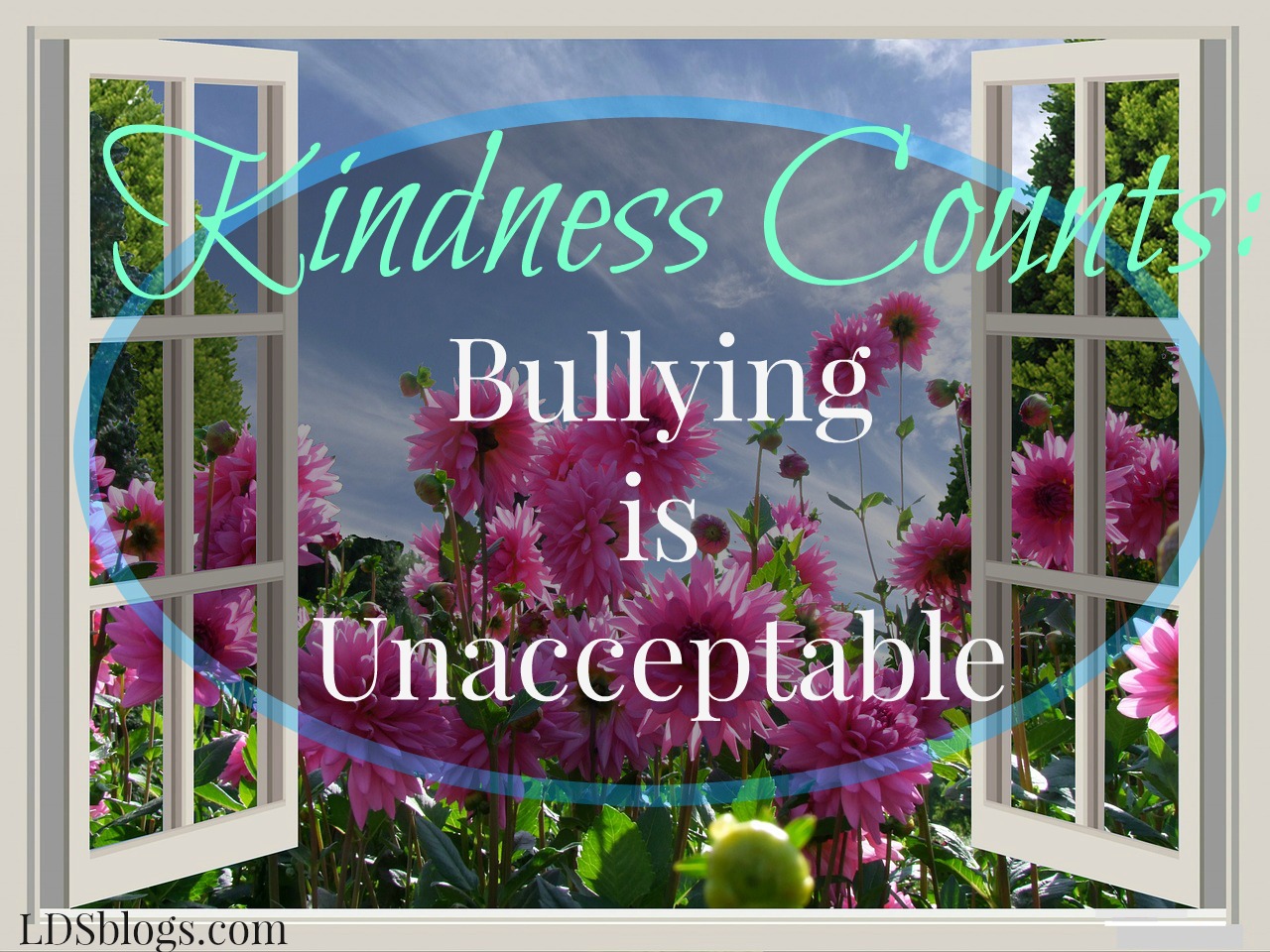Last week ldsliving.com posted a story about bullying at church. I was mortified to read the details of this post as it made me feel sick to my stomach that children from families of The Church of Jesus Christ of Latter-day Saints (LDS Church) would do such a thing to each other in a church setting. If those who profess to be Christians are resorting to such behavior at Church, how are they going to learn to treat others outside of a church? It was heart wrenching to me to read many of the 149 comments posted after this story and wondered to myself what can we do as parents and church leaders about this growing inappropriate behavior at a place we call a house of worship?
 This kind of behavior from adults and children need to stop and the perfect place we can start is at home. What kind of parent treats their own children unkindly? What example can we set to help our children learn the importance of treating everyone with kindness as Christ would? No matter how thick a skin we think we have, being mocked and ridiculed hurts and stays with us for a very long time. As a youth leader in my church, I have paid attention to the actions of other youth and realize their ideas come from home.
This kind of behavior from adults and children need to stop and the perfect place we can start is at home. What kind of parent treats their own children unkindly? What example can we set to help our children learn the importance of treating everyone with kindness as Christ would? No matter how thick a skin we think we have, being mocked and ridiculed hurts and stays with us for a very long time. As a youth leader in my church, I have paid attention to the actions of other youth and realize their ideas come from home.
- Teach kindness at home: This is an ongoing lesson for many parents to teach their children but there are some insights you can share with them to help them understand how hurtful they can be to others.
A great family activity is to help children and parents understand the hurtfulness of name calling. Start with drawing of a person on paper. Life size or smaller does not matter. Name this person on paper. Then allow your children to write rude and inconsiderate words they would hear at school or church on this paper. Crinkle the paper up as if to throw it away and then open it up and flatten it out. Discuss how others feel when they hear these words and relate it to the crinkled up paper. There are deep hurts involved and they are difficult to remove as the wrinkles in the paper are difficult to remove. Then create another person on paper and write kind and loving words on it–the kind of words we would like to hear. Compliments, positive thoughts, and other good words are to be included and commit each family member to try to use these words instead of the hurtful ones.
-
 Demand a “no-pranks rule” from leaders: Boys and Girls’ Camp are activities our youth look forward to every year. Youth Conference is also a special time for youth. What could be a wonderful experience for many youth can turn very ugly when pranks are played out at these activities. I have seen this with my own eyes and what might seem harmless in the beginning will end up as the worst experience of summer camp or youth conference. Declare a prank free week to during their activity and help leaders understand the importance of keeping this time prank free. Help them to understand how hurtful they are. This is one of the “foolish traditions of our fathers” we hear so much about in scriptures. What good comes from scaring the wits out of someone, wetting beds with pitchers of water, blowing fog horns to wake everyone up in the middle of the night, or a host of many other “tricks” youth or leaders play on each other? No good can come from these activities.
Demand a “no-pranks rule” from leaders: Boys and Girls’ Camp are activities our youth look forward to every year. Youth Conference is also a special time for youth. What could be a wonderful experience for many youth can turn very ugly when pranks are played out at these activities. I have seen this with my own eyes and what might seem harmless in the beginning will end up as the worst experience of summer camp or youth conference. Declare a prank free week to during their activity and help leaders understand the importance of keeping this time prank free. Help them to understand how hurtful they are. This is one of the “foolish traditions of our fathers” we hear so much about in scriptures. What good comes from scaring the wits out of someone, wetting beds with pitchers of water, blowing fog horns to wake everyone up in the middle of the night, or a host of many other “tricks” youth or leaders play on each other? No good can come from these activities.
 From one father: “The most enjoyable, successful, and spiritual camps that we know of have been those where my wife has been involved and pranks have been ‘outlawed’. And there always seems to be hard feelings, at least at first, because some of the youth, their parents, and even other leaders take it personal or think no one will have any fun without any pranks or what I would call bullying (such as segregation by age, ward, or level). This has never been the case: everyone has always had a much more enjoyable time without the immature pranks and stupidity.”
From one father: “The most enjoyable, successful, and spiritual camps that we know of have been those where my wife has been involved and pranks have been ‘outlawed’. And there always seems to be hard feelings, at least at first, because some of the youth, their parents, and even other leaders take it personal or think no one will have any fun without any pranks or what I would call bullying (such as segregation by age, ward, or level). This has never been the case: everyone has always had a much more enjoyable time without the immature pranks and stupidity.”
Leaders would be wise in our youth activities to create a rule which is proactive in using no pranks at all.
- Council with Church Leaders: When problems arise, talk to Church leaders about what has happened and how this can be prevented or improved. With open lines of communication between leaders and parents, bullying or unkind actions can be stopped. If you are a leader at church, then it’s in the best interest of the safety of our youth to take complaints seriously. There are different kinds of bullying, including being excluded from the group. Those who struggle to feel welcome at church are often ignored but through the kindness of others can be included and made to feel comfortable.
Joseph Wirthlin, an LDS Church leader spoke of kindness in life. He said “Kindness is the essence of a celestial life. Kindness is how a Christ-like person treats others.”
If church leaders and parents keep kindness as their watch word to guide youth in activities and classes, then this ugliness of bullying will stop.
- Remember our Greatest Example: The best example we can ever use with youth, parents and leaders is our Savior, Jesus Christ. He has set the precedent for kindness.
Joseph Wirthlin’s also says, in the same talk: “Jesus, our Savior, was the epitome of kindness and compassion. He healed the sick. He spent much of His time ministering to the one or many. He spoke compassionately to the Samaritan woman who was looked down upon by many. He instructed His disciples to allow the little children to come unto Him. He was kind to all who had sinned, condemning only the sin, not the sinner. He kindly allowed thousands of Nephites (people of the Book of Mormon) to come forward and feel the nail prints in His hands and feet. Yet His greatest act of kindness was found in His atoning sacrifice, thus freeing all from the effects of death, and all from the effects of sin, on conditions of repentance.)
There is no reason for unkindness anywhere especially at church where everyone professes to emulate the life of Christ. As Christians, we are all trying our best to live a good life and make good choices. Mixing in a bully’s torment to others is not a Christ-like life style. Bullying is unacceptable.
Valerie Steimle has been writing as a family advocate for over 25 years. As a convert to The Church of Jesus Christ of Latter-day Saints, she promotes Christian living in her writings and is the mother of nine children and grandmother to twelve. Mrs. Steimle authored six books and is a contributing writer to several online websites. To her, time is the most precious commodity we have and knows we should spend it wisely.
To read more of Valerie’s work, visit her at her website, The Blessings of Family Life.







